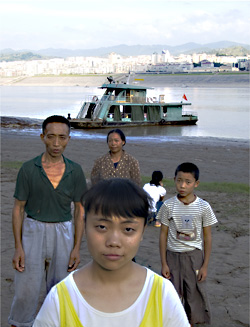“It’s hard being a human, but being a common person in China is even more difficult,” says one tearful shopkeeper along the soon-to-be-submerged banks of the Yangtze River in Sino-Canadian documentary filmmaker Yung Chang’s lucid, beautifully observed portrait of the same incipient flood zone that served as the backdrop for Jia Zhang-ke’s Still Life and its companion documentary, Dong. Whereas Jia turned his attention to the two million zombielike former residents forced to relocate on account of the world’s largest hydroelectric-dam project, Chang focuses on the luxury pleasure boats that sail up and down the titular waterway, offering tourists a “farewell” cruise through this ghostly landscape of crumbling buildings painted with water-level markers (150m, 175m, etc.). The ships themselves are hardly less surreal, as elderly cabaret singers rub elbows with young Chinese staffers who have been given American names and instructed in the politesse of dealing with the (mostly) Western clientele. (“Don’t talk about monarchies, royal families, Northern Ireland, or the independence of Quebec.”) By journey’s end, Yung has found, in the Yangtze, a brilliant natural metaphor for upward mobility in modern China: Whether they hail from the lowlands or the urban centers, everyone here is scrambling to reach higher ground.
PICK Up the Yangtze: Progress has its way with the hapless peasants of China








